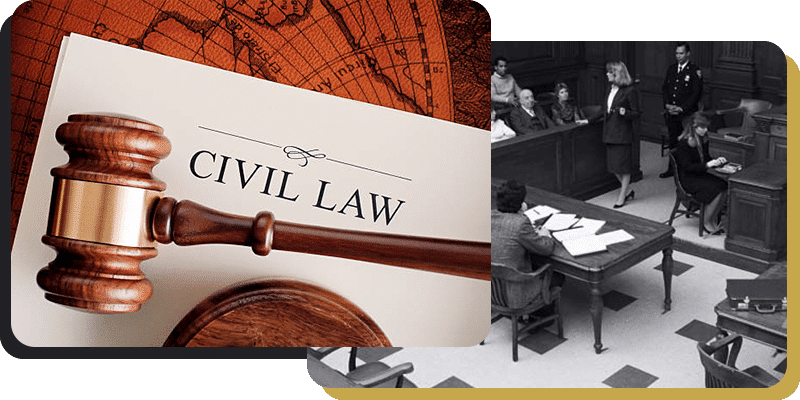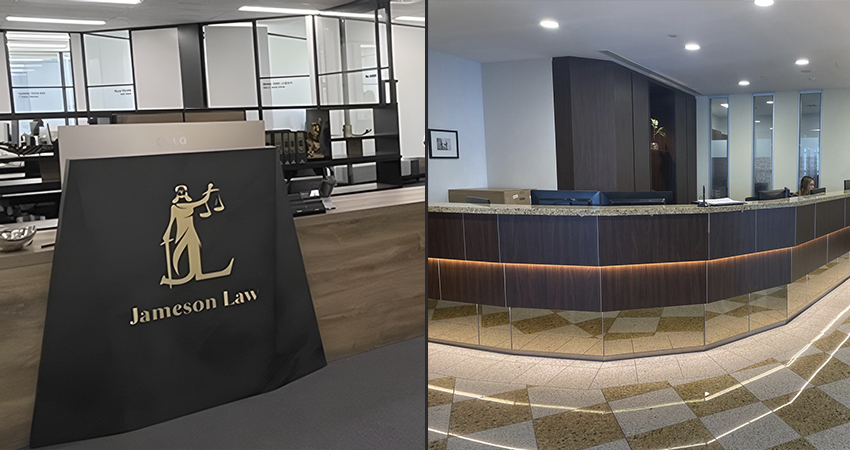BOOK YOUR CONSULTATION
This form submission is encrypted and secure.

Civil
Lawyer Sydney
Lawyer Sydney

Back to back winners of the most prestigious Local Business Awards and multiple criminal defence category awards.


Civil
Lawyer
Lawyer

Back to back winners of the most prestigious Local Business Awards and multiple criminal defence category awards.

Our experienced lawyers will run your matter to the full extent of the law to ensure success.
Award-winning Sydney Law Firm
We have won several client service excellence and leading law firm awards every year up to and including 2025.
Proven Track
Record
50+ Years of Combined Experience litigating civil matters means a successful outcome is on the table.
5 Star Reviews
Everywhere
We’re in it to win it and we fight hard for our clients. That’s why anywhere you look you will find 5 star reviews.
Book a
Consultation Today
If your conveyance is important to us. Call Jameson Law for a headache and stressfree settlement.
Award-winning Sydney Law Firm
We have won several client service excellence and leading law firm awards every year up to and including 2025.
Proven Track Record
40+ years of combined experience delivering exceptional outcomes across various legal matters.
5 Star Reviews Everywhere
We’re in it to win it and we fight hard for our clients. That’s why anywhere you look you will find 5 star reviews.
Book a
Consultation Today
If your conveyance is important to us. Call Jameson Law for a headache and stressfree settlement.
We understand that civil disputes can often feel frustrating, all-consuming and draining. At Jameson Law, our experienced lawyers specialise in civil matters and can provide high quality, honest legal advice and legal services to assist with your dispute resolution or civil litigation matter.
Civil Law Experts
Whether you are a claimant or defendant in a civil dispute, our experienced lawyers can assist with any civil litigation or dispute resolution matter, with expertise in the following areas of law:
![]() Civil litigation and dispute resolution
Civil litigation and dispute resolution
![]() Debt recovery
Debt recovery
![]() Bankruptcy
Bankruptcy
![]() Banking disputes
Banking disputes
![]() Private Housing and Department of Housing disputes
Private Housing and Department of Housing disputes
![]() Centrelink Disputes
Centrelink Disputes
![]() Personal Injury
Personal Injury
![]() Tenancy disputes and real estate matters
Tenancy disputes and real estate matters
![]() Neighbour disputes
Neighbour disputes
![]() Breach of contract or agreement
Breach of contract or agreement
![]() Defamation law
Defamation law
![]() Motor vehicle accidents and motor vehicle compensation claims especially for uninsured parties
Motor vehicle accidents and motor vehicle compensation claims especially for uninsured parties
Ultimately, our law firm can provide you with the best lawyers to assist with your civil dispute matter. Our experienced lawyers are well-equipped to provide high quality legal advice and advocacy in legal matters across all jurisdictions, whether in the Supreme Court or in tribunal matters.

What does a civil lawyer do?
In Australia, a civil lawyer specialises in civil law, and is responsible for providing legal advice and advocacy for clients who have a legal matter that is non-criminal in nature. Generally, civil lawyers represent parties in civil disputes in which one party argues that another party has committed some act that has resulted in loss or damage to them, and that party seeks for the act to stop, or for compensation for loss or damage that has resulted from the act.
Civil law includes all legal matters outside of the criminal law, including commercial disputes and breach of contract, family law matters, personal injury claims, employment law, real estate and property law (including lease and tenancy disputes), defamation, insolvency and medical negligence claims.
A civil lawyer is responsible for assisting clients to resolve the kinds of disputes which often arise in these areas of law. This role includes the following:
1. advice: providing high quality legal advice, for clients who seek the counsel of a lawyer as to their rights, whether a claim is likely to be successful or successfully defended, or the legal options available to a client in seeking a desired outcome from their civil matter; and
2. advocacy: civil lawyers are qualified to represent clients in civil litigation and tribunal hearings. Representation is critical, and this role includes providing advocacy for clients at hearings, the drafting of submissions and legal documents in consultation with their clients, and negotiating with other parties to seek the most efficient, desirable resolution of the matter (including in pre-trial settlement negotiations).
Ultimately, civil lawyers are responsible for guiding clients through confusing legal processes, providing high quality legal advice and explaining legal concepts in real terms. Civil lawyers main focus should always be on the outcome that is best for their client. If you have a legal dispute, it is essential that you have the best lawyers on your side who can provide impartial, honest and high quality legal services. For a consultation, contact our law firm to discuss your legal matter today.
What is the difference between a civil and a criminal lawyer?
While criminal lawyers deal with the law relating to criminal offences and the consequences for those who commit them, civil lawyers deal exclusively with private matters between two legal entities (which includes individuals and companies). Criminal lawyers specialise in defending those accused of committing criminal offences, or prosecuting those offences.
Where a dispute arises between two legal entities, or one argues they have otherwise been wronged by the other, civil lawyers will represent the parties to defend their interests and enforce their legal rights. Civil lawyers specialise in a range of areas of law across a range of legal issues, and provide a variety of legal services in support of their clients. These legal services include legal advice about the prospects of a legal matter and the rights of their client in the face of a legal dispute, advocacy and representation in any dispute resolution including in courts or tribunals, and legal aid in the kinds of disputes outlined above.
What areas of law does a civil lawyer specialise in?
Civil lawyers can assist in a variety of legal matters, with some specialising in one area, and others providing more general legal assistance to clients in dispute resolution or commercial litigation matters.
1. Personal injury: if you have been injured and you believe somebody is at fault, civil lawyers can provide expert legal services to seek the compensation to which you are entitled. If you have been injured at work, in a shopping centre or even at a train station, a civil lawyer can provide expert advice and advocacy to assist with compensation for any injury and medical expenses incurred as a result
2. Family law: family lawyers specialise in all aspects of family law, including separation and divorce matters, deceased estates including wills and probate matters and issues of power of attorney
3. Debt recovery: lawyers can assist with legal advice about the best way of recovering any debt owed to you, whether it be through civil litigation or otherwise
4. Employment law: our experienced lawyers specialise in a range of employment matters. This includes unfair dismissal and unpaid wages claims, contractual disputes and drafting services (employment and consultancy contracts, etc.)
5. Property law: property lawyers specialise in real estate and property matters, including lease and tenancy disputes, property settlements and advice to vendors and purchasers in real property transactions and disputes. Property lawyers also specialise in construction law and litigation, in relation to home building contracts and home building claims in respect of defective or incomplete work
6. Commercial law: commercial lawyers are experts in assisting individuals and companies with commercial transactions and disputes, as well as setting up companies and partnership structures for corporate ventures, superannuation schemes and small businesses
7. Defamation law: a complex area of law, defamation lawyers assist those whose reputation has been damaged, including seeking compensation or defending a claim for compensation on the basis of alleged defamation
8. Human rights: civil lawyers can provide expert legal advice where human rights infringements might have taken place. Whether in the context of your employment, acquisition of your property, or otherwise.
9. Medical negligence: if you have been injured as a result of the negligence of a medical professional, lawyers who specialise in medical negligence can assist you with obtaining compensation for your injury
10. Motor vehicle accidents: civil lawyers can assist with all aspects of motor vehicle-related claims, including insurance and compensation claims, as well as legal advice in relation to any disputes which arise in the context of road accidents.

In a nutshell...
Civil lawyers specialise in all non-criminal law matters, focusing on disputes between two or more parties. Civil lawyers provide dispute resolution services, and high quality legal services to assist in obtaining the outcome most desirable to their clients – whether it be compensation, dispute resolution, or otherwise. For a confidential consultation about how we can assist with your civil law or dispute resolution matter, speak to one our experienced civil litigation lawyers today.

What is civil litigation?
If your civil law matter cannot be resolved by mediation or settlement negotiations, the dispute may need to be resolved by a Court or Tribunal. This process is called civil litigation, which simply refers to the process of applying to the Court or Tribunal for a legal remedy such as compensation, preparing for and attending hearings, and having the matter decided by that Court.
Civil litigation can be a complex, time-consuming, costly and emotionally-draining process. Civil litigation matters involve court-specific forms and procedures and complicated legal authority requiring experienced lawyers who specialise in the areas of law relevant to the civil dispute. Often, civil litigation matters consume months and years rather than days and weeks. Where a dispute involves people close to one another, such as in family law matters, civil litigation can exacerbate the tensions involved in the dispute resolution process and the “us vs. them” mentality that accompanies many civil disputes.
In addition, limitation periods applicable in each Australian jurisdiction mean that time limits apply to making of civil claims. Often these time limits can be difficult to navigate and differ depending on the nature of the civil dispute. In some civil matters such as unfair dismissal or unpaid wages matters, time limits can be as little as 28 days. This means that claimants need to act quickly to ensure that they are able to obtain the compensation they deserve, and to minimise the risk that a Court will refuse any entitlements because the claimant is either out of time, or has allowed damage to continue.
Why would I litigate my civil matter?
Despite all of the complexities involved with many civil matters and the dispute resolution mechanisms available, there are significant advantages to pursuing your civil dispute through a Court or Tribunal. First, there is no limit on the amount of compensation (called “damages” in a civil litigation context), provided you are able to prove that you have suffered loss or damage, or are otherwise entitled to that compensation. Courts also allow for compensation from a wrongdoers employer, meaning that where a civil dispute arises and the defendant was acting in the course of their employment, compensation may be claimed from the employer. This vastly increases the likelihood of a favourable outcome for claimants.
In addition to compensation, Courts are also able to award further “damages” where a defendant has acted with disregard for a claimant, or out of malice. These damages can often be lucrative and difficult to obtain outside of Court.
In addition, While civil litigation can be costly, civil matters are resolved through a settlement negotiation prior to the matter being heard in Court or any court processes being engaged. Even the threat of civil litigation, and the significant costs involved in defending a claim, can be a critical negotiation tool in the favourable resolution of a civil dispute for a claimant. Our legal team is available to guide you through this process with high quality legal advice, to represent you in any correspondence and negotiations, and to fight for your right to any compensation or remedy to which you are entitled.
What is the difference between a Court and a Tribunal?
While Courts have a general jurisdiction (authority) to hear any range of civil matters, Tribunals are established by law and usually specialise in the hearing of disputes that fall into a specific category. If your civil dispute falls within such a category, then generally the relevant Tribunal will be your first avenue for dispute resolution.
For example, any tenancy or lease disputes in NSW will generally be required to be brought before the NSW Civil and Administrative Tribunal (NCAT), which has a division with specific jurisdiction to hear tenancy and lease disputes. Similar divisions exist in respect of home building claims, consumer, and commercial claims. NCAT is designed to be accessible and provide specific early dispute resolution facilities to aid in the cheap and quick resolution of the kinds of disputes that fall within the tribunal’s jurisdiction.
If a civil dispute is heard by a Tribunal such as NCAT and a party is not happy with the decision made by that Tribunal, then in some instances they may appeal that decision to an “Appeal Panel”. Depending on the nature and scale of the dispute, the matter can then be further appealed to a Court. In NSW, NCAT decisions can be appealed to the District Court, the Land and Environment Court, or the Supreme Court, depending again on the nature and scale of the dispute and the grounds for appeal.

Disclaimer
The above is general legal information and should not be considered legal advice. You should speak with one of our migration lawyers for legal advice tailored to your specific legal matter. The courts and tribunals deal with matters on a case by case basis. It should also be noted that there may be delays due to COVID-19.
Speak to an Expert Lawyer today

WE'RE IN IT TO WIN IT
Book your consultation
- This form submission is encrypted and secured to ensure your information remains confidential.
This form submission is encrypted and secured to ensure your information remains confidential.
What our Clients Say
Trustindex verifies that the original source of the review is Google. Worked with Nora and Cooper both really supportive and great help with my traffic matter highly recommendTrustindex verifies that the original source of the review is Google. I had the pleasure of being represented by Nora Sayeed from Jameson Law, and I couldn’t be more grateful for her support and professionalism throughout my legal matter. From our very first interaction, Nora was attentive, understanding, and thorough in her approach. She took the time to carefully listen to my situation, explained every step clearly, and made sure I felt supported at every stage. What stood out the most was her dedication and prompt action. Thanks to her efforts, we were able to successfully withdraw the charge before it even reached the hearing stage. Nora’s expertise, compassion, and calm demeanor made a stressful situation far more manageable. I truly appreciated how she went above and beyond to ensure a positive outcome. I highly recommend Nora to anyone in need of reliable and empathetic legal representation.Trustindex verifies that the original source of the review is Google. Reduced my suspension to 3wks from 3months.. for serious speeding charge. Amazing lawyers nora and cooperTrustindex verifies that the original source of the review is Google. I highly recommend Nora and the team at Jameson Law. Nora is professional, courteous, hard working and diligent. I cannot Thank you enough for our positive outcome. I recommend this firm 100%. A big shout out to Nora and Cooper. Keep up your professionalism. Would not go to anyone else for my legal matters. From the bottom of my heart THANKYOU.Trustindex verifies that the original source of the review is Google. Excellent service would recommend to othersTrustindex verifies that the original source of the review is Google. Nora and Cooper, what a team. Nora , you are absolutely beautiful and super intelligent.If you get in trouble Nora and Cooper are the team to help you.Such professionalism and style. Thank you both so very much.God bless you both.Trustindex verifies that the original source of the review is Google. Nora Sayed’s representation in April 2025 was outstanding. Jameson Law has a brilliant, knowledgeable Lady in their employment. The outcome was nothing short of a miracle. Nora achieved this! I thank her & wish her all the success in her Career. I would recommend Nora & Jameson Law without hesitation. Well done Thanks again. 👏🏼👏🏼😊Trustindex verifies that the original source of the review is Google. I had the pleasure of working with Nora Sayed for a legal matter, and I cannot recommend her highly enough. From the very beginning, Nora proved to be not just a knowledgeable and skilled attorney, but also someone who genuinely cares about her clients. What truly sets Nora apart was her dedication and commitment to ensuring the best possible outcome. She was always available to answer my questions, even after hours, and she was consistently responsive and approachable. Nora took the time to speak with my family, addressing their concerns and providing reassurance every step of the way, especially after hours. This level of personalized attention and care is rare to find in the legal field. Throughout the process, Nora's expertise and strategic thinking were invaluable. She made sure I understood my options, walked me through every detail, and provided guidance that gave me confidence in the decisions I was making. It was clear to me that Nora was invested in not just achieving a good result, but in helping me navigate a difficult situation with as much peace of mind as possible. I found her also very kind and compassionate. She truly goes above and beyond for her clients, and I am incredibly grateful for all the hard work she put into my case. Thanks to Nora, I had the best possible outcome, and I will forever be thankful for her support. Thank you, Nora, for everything you did!
Essential Updates and Resources on Civil Law
Integrating Large Language Models (LLMs) into Legal Practice To stay competitive in the evolving legal landscape, law firms must proactively
Contract law falls within civil law legislation and is subject to civil proceedings. Civil law proceedings comprise areas of law
A dispute over the common fence with your neighbour can trouble you every single day. We have been instructed to
In the Australian legal system, burdens and standards of proof play a critical role in determining the outcome of a
The simple answer is, it depends! Fraud can be considered both a criminal offense and a civil tort in New
Civil and Criminal law deals with a multitude of matters but are categorised as different types of disputes in NSW
Transfer of property from trustee to beneficiary and asset protection Depending on your personal circumstances, having an asset protection strategy
The legal system can be incredibly complex and confusing. Most of the general public understand the legal system to only
Teachers, health and construction workers have unsuccessfully challenged the Health Minister A group of workers made up of teachers, health
Privacy vs pandemic Privacy vs pandemicMass vaccination appears to be our ticket out of lockdowns. However, concern is being raised
FAQs
Frequently Asked Questions.
What is the job of a civil lawyer?
Civil law helps settle disputes that come up in day to day life such as debts, unpaid fines, discrimination, tenancy issues, tenancy disputes, neighbour disputes, defamation, Centrelink disputes and more.
What is civil law in Australia?
Civil law covers what rights and responsibilities that individuals, government departments and organisations have in their interactions with each other. Civil breaches are generally reprimanded in fines and/or settlement amounts. On some occassions, where a civil court finds fraud or criminal elements, prosecutors may get involved and press charges.
WE'RE IN IT TO WIN IT
Book your consultation
- This form submission is encrypted and secured to ensure your information remains confidential.
This form submission is encrypted and secured to ensure your information remains confidential.
OUR SYDNEY OFFICES
Parramatta CBD - Head Office
- (02) 8806 0866
- 0488 817 882
- 02 9052 0840
- info@jamesonlaw.com.au
- Suite 301, 67-69 Philip St Parramatta NSW 2150
Sydney CBD - Practice Office
- 02-8806-0866
- 0488 817 882
- 02 9052 0840
- info@jamesonlaw.com.au
- Tower One Barangaroo International Towers Level 35, 100 Barangaroo Ave Sydney NSW 2000
Blacktown CBD - Practice Office
- (02) 8806 0866
- 0488 817 882
- 02 9052 0840
- info@jamesonlaw.com.au
-
Level 3 81 Flushcombe Road, Blacktown NSW 2148
(By Appointment Only)

Liverpool CBD - Practice Office
- (02) 8806 0866
- 0488 817 882
- 02 9052 0840
- info@jamesonlaw.com.au
-
Level 2, 215-219 George Street, Liverpool NSW 2170
(By Appointment Only)

Bankstown CBD - Practice Office
- (02) 8806 0866
- 0488 817 882
- 02 9052 0840
- info@jamesonlaw.com.au
-
23 Restwell Street, Bankstown NSW 2200
(By Appointment Only)



Court Houses We Frequent
Local Courts
Balmain Local Court
- 1300 679 272
- local-court-burwood@justice.nsw.gov.au
- 368 Darling Street, Balmain NSW 2041
Registry: Monday to Friday, 9:00am to 4:30pm
Bankstown Local Court
- 1300 679 272
- (02) 9722 6060
- PO Box 71 BANKSTOWN NSW 2200
- local-court-bankstown@justice.nsw.gov.au
- Cnr Chapel Road and The Mall BANKSTOWN NSW 2200
Court Operating Hours: 9:30am-4:30pm
Blacktown Local Court
- 1300 679 272
- (02) 9672 2666
- PO Box 217 BLACKTOWN NSW 2148
- local-court-blacktown@justice.nsw.gov.au
- 1 Kildare Road Blacktown NSW 2148
Registry Hours: 9:00 – 4:30
Telephone Hours: 8:30 -4:30
Days open: Mon-Fri
Burwood Local Court
- 1300 679 272
- (02) 9744 4144
- PO Box 235 BURWOOD NSW 1805
- local-court-burwood@justice.nsw.gov.au
- 7-9 Belmore Street BURWOOD NSW 2134
Registry Hours: 9:00 – 4:30
Telephone Hours: 8:30 – 4:30
Days open: Mon – Fri
Campbell Local Court
- 1300 679 272
- (02) 9821 7888
- PO Box 3435 LIVERPOOL WESTFIELDS NSW 2170
- local-court-campbelltown@justice.nsw.gov.au
- 150 George Street LIVERPOOL NSW 2170
Registry Hours: 9:00 – 4:30
Telephone Hours: 8:30 – 4:30
Days open: Mon – Fri
Central Local Court
- 1300 679 272
- (02) 4223 3633
- PO Box 5395 WOLLONGONG NSW 2500
- local-court-wollongong@justice.nsw.gov.au
- Cnr Market and Church Streets WOLLONGONG NSW 2500
Registry Hours: 9:00 – 1:00 and 2:00 – 4:30
Telephone Hours: 8:30 – 4:30
Downing Local Court
- 1300 679 272
- (02) 4223 3633
- PO Box 5395 WOLLONGONG NSW 2500
- dclc@justice.nsw.gov.au
- 143-147 Liverpool Street, Sydney NSW 2000
- Nearest Train Station: Museum Station (Liverpool Street entrance is directly opposite)
- Levels: Local Court matters are heard on levels 4 and 5.
- Public Transport: Well-served by buses and trains, with easy access to nearby bus stops and Museum Station.
- Parking: Limited street parking is available, and there are several public parking garages nearby.
Registry Hours: 9:00 – 1:00 and 2:00 – 4:30
Telephone Hours: 8:30 – 4:30
Wollongong Local Court
- 1300 679 272
- (02) 4223 3633
- PO Box 5395 WOLLONGONG NSW 2500
- local-court-wollongong@justice.nsw.gov.au
- Cnr Market and Church Streets WOLLONGONG NSW 2500
Registry Hours: 9:00 – 1:00 and 2:00 – 4:30
Telephone Hours: 8:30 – 4:30
Fairfield Local Court
- 1300 679 272
- (02) 4223 3633
- PO Box 5395 WOLLONGONG NSW 2500
- local-court-wollongong@justice.nsw.gov.au
- Cnr Spencer St & Court Rd, Fairfield NSW 2165
Registry Hours: 9:00 – 1:00 and 2:00 – 4:30
Telephone Hours: 8:30 – 4:30
Hornsby Local Court
- 1300 679 272
- (02) 9847 9955
- PO Box 96 HORNSBY NSW 1630
- local-court-hornsby@justice.nsw.gov.au
- 294 Peats Ferry Rd HORNSBY NSW 2077
Registry Hours: 9:00 – 1:00 and 2:00 – 4:30
Telephone Hours: 8:30 – 4:30
Liverpool Local Court
- 1300 679 272
- (02) 9722 6060
- PO Box 71 BANKSTOWN NSW 2200
- local-court-bankstown@justice.nsw.gov.au
- Cnr Chapel Road and The Mall BANKSTOWN NSW 2200
Registry Hours: 9:00 – 1:00 and 2:00 – 4:30
Telephone Hours: 8:30 – 4:30
Manly Local Court
- 1300 679 272
- (02) 9722 6060
- PO Box 71 BANKSTOWN NSW 2200
- local-court-bankstown@justice.nsw.gov.au
- Cnr Chapel Road and The Mall BANKSTOWN NSW 2200
Registry Hours: 9:00 – 1:00 and 2:00 – 4:30
Telephone Hours: 8:30 – 4:30
Newtown Local Court
- 1300 679 272
- (02) 9722 6060
- PO Box 71 BANKSTOWN NSW 2200
- local-court-bankstown@justice.nsw.gov.au
- Cnr Chapel Road and The Mall BANKSTOWN NSW 2200
Registry Hours: 9:00 – 1:00 and 2:00 – 4:30
Telephone Hours: 8:30 – 4:30
Parramatta Local Court
- 1300 679 272
- (02) 4223 3633
- PO Box 92 Parramatta NSW 2150, Australia
- local-court-parramatta@justice.nsw.gov.au
- 12 George Street Parramatta NSW 2150, Australia
Registry Hours: 9:00 – 1:00 and 2:00 – 4:30
Telephone Hours: 8:30 – 4:30
Penrith Local Court
- 1300 679 272
- (02) 9722 6060
- PO Box 71 BANKSTOWN NSW 2200
- local-court-bankstown@justice.nsw.gov.au
- Cnr Chapel Road and The Mall BANKSTOWN NSW 2200
Registry Hours: 9:00 – 1:00 and 2:00 – 4:30
Telephone Hours: 8:30 – 4:30
Sutherland Local Court
- 1300 679 272
- PO Box 37, Sutherland 2232
- local-court-sutherland@justice.nsw.gov.au
- Cnr Flora and Belmont Street, Sutherland NSW 2232
Registry Hours: 9:00 – 1:00 and 2:00 – 4:30
Telephone Hours: 8:30 – 4:30
Waverley Local Court
- 1300 679 272
- (02) 9722 6060
- PO Box 71 BANKSTOWN NSW 2200
- local-court-bankstown@justice.nsw.gov.au
- Cnr Chapel Road and The Mall BANKSTOWN NSW 2200
Registry Hours: 9:00 – 1:00 and 2:00 – 4:30
Telephone Hours: 8:30 – 4:30
Windsor Local Court
- 1300 679 272
- (02) 9722 6060
- PO Box 71 BANKSTOWN NSW 2200
- local-court-bankstown@justice.nsw.gov.au
- Cnr Chapel Road and The Mall BANKSTOWN NSW 2200
Registry Hours: 9:00 – 1:00 and 2:00 – 4:30
Telephone Hours: 8:30 – 4:30
Wollongong Local Court
- 1300 679 272
- (02) 9722 6060
- PO Box 71 BANKSTOWN NSW 2200
- local-court-bankstown@justice.nsw.gov.au
- Cnr Chapel Road and The Mall BANKSTOWN NSW 2200
Registry Hours: 9:00 – 1:00 and 2:00 – 4:30
Telephone Hours: 8:30 – 4:30
District Courts
Downing Centre District Court
- 1300 679 272
- PO Box 71 BANKSTOWN NSW 2200
- downingcentredc@justice.nsw.gov.au
- 143-147 Liverpool Street, Sydney NSW 2000
Registry Hours: 9:00 – 4:30
Telephone Hours: 8:30 – 4:30
Days open: Mon – Fri
Parramatta District Court
- (02) 8688 7777
- local-court-bankstown@justice.nsw.gov.au
- 12 George Street, Parramatta NSW 2150
Registry Hours: 9:00 – 4:30
Days open: Mon-Fri
Penrith District Court
- 1300 679 272
- local-court-penrith@justice.nsw.gov.au
- 64-72 Henry Street, Penrith NSW 2750
Registry Hours: 9:00 – 4:30
Days open: Mon-Fri
Campbelltown District Court
- 1300 679 272
- local-court-campbelltown@justice.nsw.gov.au
- Railway Street, Campbelltown NSW 2560
Registry Hours: 9:00 – 4:30
Days open: Mon – Fri
Liverpool District Court
- 1300 679 272
- local-court-liverpool@justice.nsw.gov.au
- 150 George Street, Liverpool NSW 2170
Registry Hours: 9:00 – 4:30
Days open: Mon – Fri
Wollongong District Court
- 1300 679 272
- local-court-wollongong@justice.nsw.gov.au
- 97-99 Market Street, Wollongong NSW 2500
Registry Hours: 9:00 – 1:00 and 2:00 – 4:30
Telephone Hours: 8:30 – 4:30
Supreme Courts
Supreme Court New South Wales
- 1300 679 272
- (02) 9230 8025
- (02) 9230 8233
- GPO Box 3 Sydney NSW 2001 Australia
- sc.enquiries@justice.nsw.gov.au
- Law Courts Building 184 Phillip Street Sydney NSW 2000
Registry Hours: 9:00 AM – 4:30 PM
Telephone Hours: 8:30 AM – 4:30 PM
Days Open: Monday to Friday
Federal Court
Federal Circuit and Family Court of Australia
- 1300 352 000
- (02) 9230 8000
- GPO Box 9991, Sydney NSW
- enquiries@fcfcoa.gov.au
- Lionel Bowen, Building, 97/99 Goulburn St, Sydney NSW 2001
Registry Hours: 9:00 AM – 4:30 PM
Telephone Hours: 8:30 AM – 5:00 PM
Days Open: Monday to Friday
Federal Court
- 1300 720 980
- (02) 9230 8020
- GPO Box 9991, Sydney NSW
- enquiries@fedcourt.gov.au
- 97-99 Goulburn St in the heart of the Sydney CBD
Monday to Friday, 8:30 AM – 4:30 PM
High Court
- (02) 6270 6811
- (02) 6270 6868
- Parkes Place, Canberra ACT 2600
- enquiries@hcourt.gov.au
- Parkes Place, Canberra ACT 2600
Monday to Friday, 8:30 AM – 5:00 PM
Specialised Courts
Children’s Court of New South Wales
- 1300 679 272
- (02) 9722 6060
- Cnr Chapel Road and The Mall BANKSTOWN NSW 2200
- PO Box 71 BANKSTOWN NSW 2200
- sc.enquiries@justice.nsw.gov.au
Registry Hours: 9:00 AM – 4:30 PM
Telephone Hours: 8:30 AM – 4:30 PM
Days Open: Monday to Friday
Coroner’s Court New South Wales
- 1300 679 272
- (02) 9230 8025
- (02) 9230 8233
- GPO Box 3 Sydney NSW 2001 Australia
- sc.enquiries@justice.nsw.gov.au
- Law Courts Building 184 Phillip Street Sydney NSW 2000
Registry Hours: 9:00 AM – 4:30 PM
Telephone Hours: 8:30 AM – 4:30 PM
Days Open: Monday to Friday
Industrial Relations Commission of New South Wales
- 1300 679 272
- (02) 9230 8025
- (02) 9230 8233
- GPO Box 3 Sydney NSW 2001 Australia
- sc.enquiries@justice.nsw.gov.au
- Law Courts Building 184 Phillip Street Sydney NSW 2000
Registry Hours: 9:00 AM – 4:30 PM
Telephone Hours: 8:30 AM – 4:30 PM
Days Open: Monday to Friday
Land and Environment Court of New South Wales
- 1300 679 272
- (02) 9230 8025
- (02) 9230 8233
- GPO Box 3 Sydney NSW 2001 Australia
- sc.enquiries@justice.nsw.gov.au
- Law Courts Building 184 Phillip Street Sydney NSW 2000
Registry Hours: 9:00 AM – 4:30 PM
Telephone Hours: 8:30 AM – 4:30 PM
Days Open: Monday to Friday


